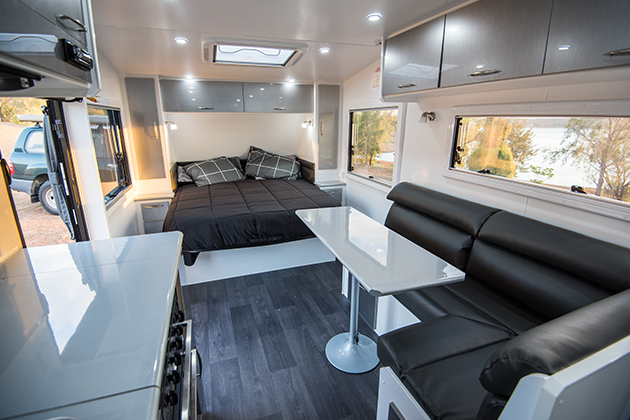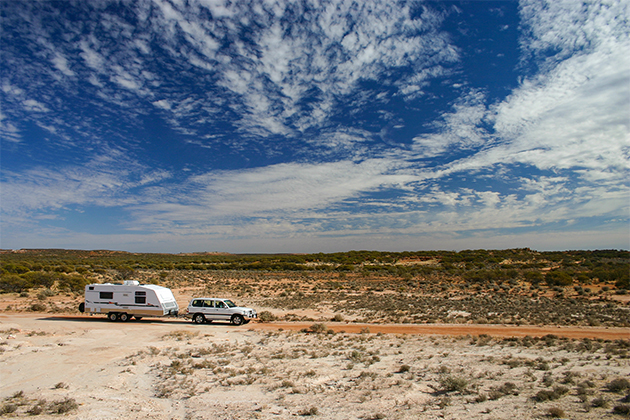Travel & Touring | Camping & Caravanning
1. Don’t overload
Before hitching anything to the back of your car, find out first what your car’s capable of towing.
Legally, the weight of whatever your car’s pulling (once the caravan is fully loaded) can’t exceed the towing capacity of your vehicle or its towbar, whichever is lowest.
Add 200kg to the weight shown on the vehicle licence paper to allow for bedding, travelling gear, stores and equipment.
The fine for towing a load over the car’s towing limit varies according to how far the limit has been exceeded. Your vehicle owners’ manual will have information about your specific towing capacity.
If your new caravan or trailer will be heavier than the towing capacity of your vehicle, you’ll need a different vehicle to do the job, or you can look at upgrading certain components of your vehicle, like the suspension, to increase its towing capacity. However, these upgrades are expensive and may impact other aspects of your vehicle. Ensuring your trailer is a safe match for your vehicle in the first place is the best option.
2. Leave enough space
If the total combined length of your vehicle and any attached trailer or caravan is 7.5m long or more, you must keep at least 60m behind any similar car/caravan or long vehicle on all roads outside built-up areas that don’t have more than one lane in the direction you’re driving, unless you are overtaking.
You should also be mindful of parking restrictions. In built-up areas, you can’t stop a long vehicle on the side of the road for more than an hour unless the driver is dropping off or picking up goods, or signage indicates you can park for longer. Outside built-up areas, you can only stop on the road if the vehicle and its load are completely on the shoulder.

3. Keep things balanced
The key thing to remember when packing your caravan is to distribute weight evenly – aside from total weight, this is the most important thing you can do to keep the caravan steady on the road.
Pack all heavy items first – just forward of the axles, low to the ground and evenly on both sides. And don’t be tempted to carry them in the car – make sure they’re secured in the proper position in the caravan.
Medium-weight items can then be loaded around the heavy ones, while your light items like clothing can be placed into overhead lockers. Never store heavy objects up high, as they will raise the caravan’s centre of gravity. Once you’re loaded up, make sure everything is securely fastened down.
Failing to properly secure a load carries a penalty.
It’s also not a good idea to attach a gas bottle to the outside of your caravan – if you’re in a crash, it poses a significant fire and explosion risk.
4. Safe speeds
Because you’re carrying a lot of extra weight behind your car, staying within a safe speed limit is critical.
When towing a trailer or caravan, the maximum speed at which you may travel is 100km/h, where posted speed limits allow.
However, even in areas where the limit is 100km/h or above, a safer towing speed is between 80-90km/h. This keeps things manageable should you need to suddenly apply the brakes, and helps you stay in control where there is a strong cross wind or uneven road surfaces. Travelling between 80-90km/h will also save fuel and allow other vehicles to safely overtake you.
Different manufacturers provide maximum speed recommendations specific to the type of vehicle - 90km may still be too high for some models so check your owners' manual.
Attempting to tow a caravan on an unsealed road is not recommended. If you're planning on using a camper-trailer on an unsealed road, it should have a high clearance and four-wheel drive tyres that can withstand corrugations and rough road surfaces.
Also remember that your vehicle’s stopping time will be increased when carrying an extra load behind you so take this into account then applying the brakes.

5. Extra wide turns
You must have a clear view of the front, side and rear of the vehicle (which in this case includes the caravan). Investing in towing mirrors to extend your range of view may help this and is highly recommended by RAC.
While on the road you may at some point need extra space when turning.
If the combination of your car and your caravan or trailer is more than 7.5m long, you may use part or all of an adjacent second lane for turning left or right if any part of your vehicle is within 50m of the nearest point of the intersection and if it’s not possible to turn left or right from the lane you’re travelling in. You will have right of way to complete such turns, but you must display the sign "Do not overtake turning vehicle" at the rear of your caravan or trailer.
You can buy these signs online or from most caravanning stores. Remember, you will still need to follow the road rules and it must be safe to turn before you do so.
Before you head off:
Service your tow vehicle – remember to service your tow vehicle regularly to keep it in top mechanical condition.
Check your suspension – the suspension of the tow vehicle should be in good order. Learn about up-rated springs and shock absorbers, you might need them.
Watch your download – the download on your towbar should never exceed the vehicle manufacturer’s recommended maximum.
Check your tyre pressure – tyre pressure on your caravan is just as important as the car you’re driving, check them both.
Test your caravan lights – make sure you check all your caravan lights are working.
Check your wheel bearings – caravans need their wheel bearings checked every twelve months. This ensures there’s no excessive play and the grease is in good condition.
Double check your connection – make sure your caravan is hitched correctly as a final measure.
Ready to embark on your caravanning adventure?
Make sure you've got the right level of cover. RAC Caravan Insurance will cover you for accident, fire and theft and includes contents cover.
This product is issued by RAC Insurance Pty Ltd. Benefits are subject to policy conditions and PED Guide. Before you make a decision, please check the PDS and TMD to see if the policy is right for you. Limits and exclusions apply.
Last updated September 2020
